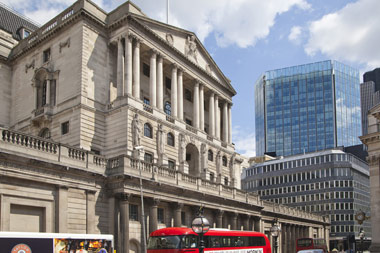BoE management was ill prepared for economic crisis, minutes show

Newly released records show central bank’s disarray and lack of coherence in face of the near collapse of Britain’s financial system
Jermaine Haughton
A stunning lack of awareness at the Bank of England in the run up to the economic crash of 2007 has been laid bare, following today’s release of previously secret documents detailing meetings between the Bank’s most senior executives. Dating from September 2007 to mid-2009 – and covering the times when Northern Rock, the Royal Bank of Scotland and HBOS all had to be bailed out – the minutes from meetings of the BoE C-suite, known as the “Court”, show how leaders regularly changed their minds about regulatory effectiveness as the crisis unfolded.
While issues of liquidity were identified, the Bank was unaware of the full extent of Northern Rock’s troubles until the BBC reported the organisation’s need for a rescue loan – leading to panicked customers lining the streets in efforts to withdraw their funds on 13 September 2007. In part, the minutes show, this was down to misjudged confidence that BoE executives had in the tripartite system of regulation it shared with the Treasury and the Financial Services Authority (FSA). On 12 September that year, the Bank even praised itself for the system, noting: “The Executive believed that the events of the last month had proven the sense and strength of the tripartite framework.”
Andrew Tyrie, chair of the Treasury Select Committee, said that the Northern Rock predicament had forced the Bank’s management to rapidly change its position on the tripartite system. “At the start of the Northern Rock crisis,” he said, “the Court was told by the Bank executive (and by the then chairman of the FSA) how well it was working. Soon, though, it was told that tensions were evident. But before long, the governor was telling the Court that the tripartite arrangements were ‘not sufficiently workable or relevant to managing a crisis’.”
The tripartite system was broken up by the Conservative-led Coalition, and the BoE now admits that it lacked adequate resolution authority to tackle macro-prudential risk. “The roles, in a crisis, of the Bank, the Treasury and the FSA were ill-defined,” the Bank said in a statement. “These issues were rapidly identified during the period covered by the minutes.”
Made public under the guidance of current BoE governor Mark Carney – who replaced Mervyn King in July 2013 – the documents also show how the emergency committee of the Court, dubbed Transco, met seven times in the fortnight leading up to the banking bailouts of October 2008 and released tens of billions of pounds in support to stop key institutions from collapsing.
Also confirmed in the minutes was the BoE’s belief that a substantial spike in national debt triggered by the bailouts was warranted to save the country’s biggest banks – and that the move would not be dangerous to the UK’s solvency. Records of a meeting held in February 2009 said: “It was suggested that much of the public commentary about the credit worthiness of the UK government was ill-informed. There was no doubt that the fiscal deficit would rise sharply … Although such a large increase would not be desirable in the long run, it was sensible to do that in the short term.”
Carney stressed that the minutes provide a humbling reminder to Bank executives, and will help to prevent similar crises happening in the future. “The financial crisis was a turning point in the Bank’s history,” he said. “These minutes provide further insight into the Bank’s actions during the exceptional period – the policies implemented to mitigate the crisis, the lessons that were learnt and how the Bank changed as a result.”
For further thoughts on maintaining awareness of trends that are key to your organisation, sign up to the forthcoming CMI seminar The Power of Knowledge.
Image of Bank of England building courtesy of IP Stone / Shutterstock.

Press & Media Enquiries
For more information or to request interviews, contact CMI's Press Team on 020 7421 2705 or email press.office@managers.org.uk


